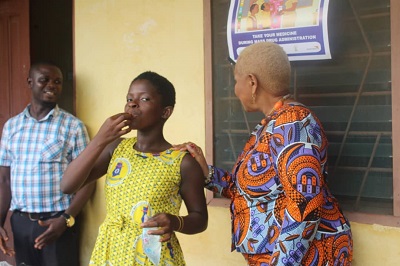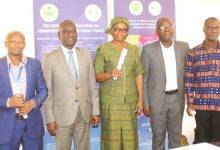
Some public and private basic schools in the country have begun the administration of praziquantel and albendazole tablets to children to protect them against bilharzia and intestinal worm infestation respectively.
The move forms part of a mass drug administration (MDA) by the Ghana Health Service (GHS) to control the spread of neglected tropical diseases (NTDs) which is endemic in the country.
About six million students from kindergarten to junior high schools in 205 districts are expected to be covered in the exercise.
A visit to selected schools in the Eastern Region yesterday found students being assisted to take the medicines after necessary vitals had been taken by the teachers and trained health coordinators.
The schools, including Nsukwow M/A Basic School, Trinity Presby Royal School both in the New Juaben Municipal and New Somanya Methodist basic School in the Yilo Krobo District among others had a significant number of the student population who had taken the medication since Monday when the exercise begun.
Close to 120 students from kindergarten to class six at the Trinity Presby School had received the tablets at the time of visit with 186 children at Nsukwow basic school having been administered.
There was concern, however, of some students refusing to take the drugs on the advice of parents, a situation Ms Hilda Ahenkorah, a teacher of the Trinity Presby School for instance, alluded to.
“Some parents also called to complain that their wards experienced stomach upsets upon taking the medicines but we assured them that it was nothing to be scared of and as we speak, all of them are in school very fit and healthy,” she noted.
The NTD Ambassador, Miss Joyce Aryee who led the delegation to tour the various schools was quite impressed with the level of participation of the schools and students alike.
She nonetheless expressed the need for increased public sensitisation on the exercise “because this borders on health and the future of the country else, we will have our future generation down with illnesses which we could have prevented.”
“The schools must understand the need for the MDA and be more passionate about it, parents must understand the cycle in which these viruses operate and why they must have their children to take these drugs.”
Dr Aryee further cautioned teachers and health coordinators in the schools against practices that may mar the exercise such as using same cup for all students to drink from while taking the medicines, giving drugs to students on empty stomach and insanitary conditions.
On his part, NTD Programme Director for the Eastern Region, Mr Christian Fiador noted the drop in bilharzia cases in the region in the last five years, which to a large extent was due to yearly MDA.
He indicated that the de-worming exercise will be conducted in all 26 districts in the region, with over 5000 schools and 75,000 pupils targeted.
The Director hoped that by next week, all schools would have been captured adding that, the region had plans in place to handle adverse cases should they occur during the exercise.
“The drugs are very safe for the children and we have ensured that teachers and some nurses are well vexed in how to administer them but even in case of any adverse effect, we have asked that such students be taken by the health coordinators to see a doctor and treatment is free,” he stated.
BY ABIGAIL ANNOH






